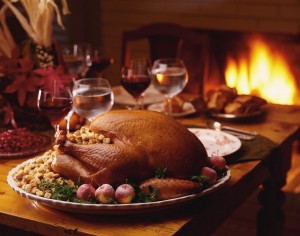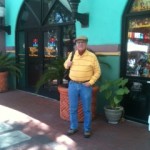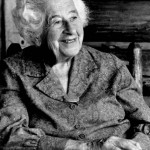What kind of country schedules four major annual holidays within a period of 60 days? Answer: America the Bootiefull. Every year we spend ten months a year trying to recover from and lose weight gained during two consecutive months of seasonal stuffing. Beginning with Halloween and ending with New Years, traditional holiday goodies are more trick than treat, more jowl-ly than jolly.
traditional holiday goodies are more trick than treat, more jowl-ly than jolly.
Actually, even if you don’t eat a lot of holiday goodies, the odds are you’re ingesting thousands more calories than usual for you. This is because holiday foods were invented by people who thought butter, sugar, and eggs constituted their own food group. What other time of the year can you consume a 2” cookie containing more calories than the daily allotment for an NFL linebacker?
Over the years, I’ve become adept at lightening up my mother’s holiday recipes. Believe me, it can be done and without altering the flavor. Most of the ingredients I substitute are empty calories you never miss. For instance, replace eggs with egg substitute, and in some cases, melted butter with reconstituted Butter Buds™. These two changes function beautifully in Mama’s dressing, eliminating a truckload of calories, a blessing because I haven’t figured out how to lighten up the cornbread and dried white bread. Applesauce can be substituted for oil in baked goods, which brings my pumpkin bread into the realm of reason. As I mentioned in my Thanksgiving blog, killer pies can be replaced by manslaughter mini-pies, eliminating much booty-bound fat.
My point is, if you just think about it, you can probably lighten up your family’s traditional recipes, too, and even your crabbiest relatives will never know the difference. It’s unrealistic to expect people to pass up holiday foods in favor of a sensible diet, but you can minimize the impact with a few simple changes. And when you’re finished, you won’t feel so much like that stuffed turkey.
I’m still working on lightening the menu for Christmas and New Year’s Day. I haven’t decided whether our traditional Christmas chili will be a tasty vegetarian version or made with lean bison in lieu of beef. The tamales will certainly be of the vegetarian or chicken variety. (You don’t really want to know what the traditional ones are made from anyway.) And as for my New Year’s blackeyed peas, I can’t do much about those calories, once I eliminate the slab bacon my mother cooked with hers. I’m open to suggestions.
So do your family and yourself a favor this year. Do the lighten-up with those holiday recipes, before your clothes do the tighten-up. You won’t be deprived of the holiday munch-down, and you’ll feel a lot better afterwards.







